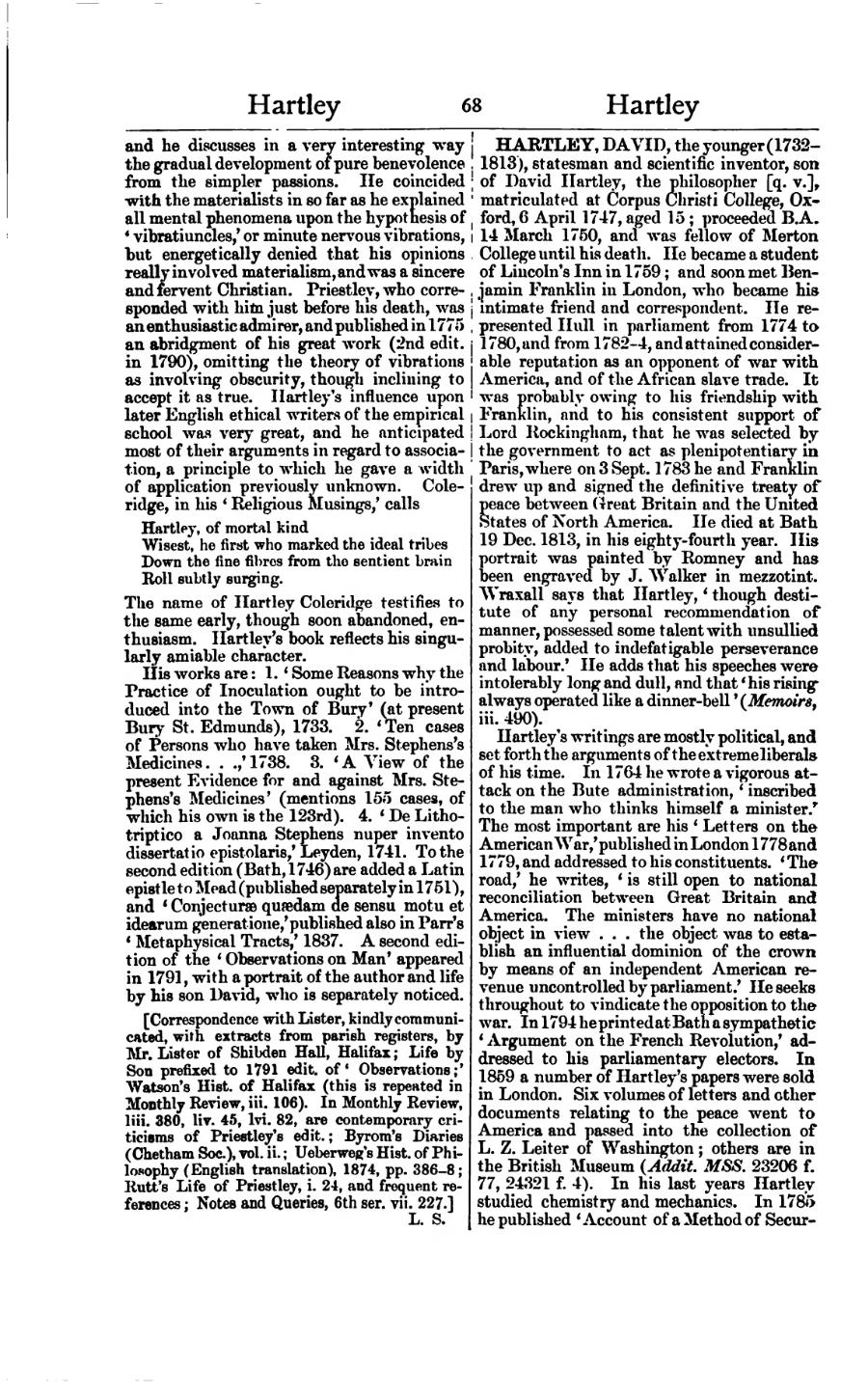and he discusses in a very interesting way the gradual development of pure benevolence from the simpler passions. He coincided with the materialists in so far as he explained all mental phenomena upon the hypothesis of 'vibratiuncles,' or minute nervous vibrations, but energetically denied that his opinions really involved materialism, and was a sincere and fervent Christian. Priestley, who corresponded with him just before his death, was an enthusiastic admirer, and published in 1775 an abridgment of his great work (2nd edit. in 1790), omitting the theory of vibrations as involving obscurity, though inclining to accept it as true. Hartley's influence upon later English ethical writers of the empirical school was very great, and he anticipated most of their arguments in regard to association, a principle to which he gave a width of application previously unknown. Coleridge, in his 'Religious Musings,' calls
Hartley, of mortal kind
Wisest, he first who marked the ideal tribes
Down the fine fibers from the sentient brain
Roll subtly surging.
The name of Hartley Coleridge testifies to the same early, though soon abandoned, enthusiasm. Hartley's book reflects his singularly amiable character.
His works are: 1. 'Some Reasons why the Practice of Inoculation ought to be introduced into the Town of Bury' (at present Bury St. Edmunds), 1733. 2. 'Ten cases of Persons who have taken Mrs. Stephens's Medicines. . .,' 1738. 3. 'A View of the present Evidence for and against Mrs. Stephens's Medicines' (mentions 155 cases, of which his own is the 123rd). 4. 'De Lithotriptico a Joanna Stephens nuper invento dissertatio epistolaris,' Leyden, 1741. To the second edition (Bath, 1746) are added a Latin epistle to Mead (published separately in 1751), and 'Conjecturte qusedam de sensu motu et idearum generatione,' published also in Parr's 'Metaphysical Tracts,' 1837. A second edition of the 'Observations on Man' appeared in 1791, with a portrait of the author and life by his son David, who is separately noticed.
[Correspondence with Lister, kindly communicated, with extracts from parish registers, by Mr. Lister of Shibden Hall, Halifax; Life by Son prefixed to 1791 edit, of 'Observations;' Watson's Hist, of Halifax (this is repeated in Monthly Review, iii. 106). In Monthly Review, liii. 380, liv. 45, lvi. 82, are contemporary criticisms of Priestley's edit.; Byrom's Diaries (Chetham Soc), vol. ii.; Ueberwog's Hist, of Philosophy (English translation), 1874, pp. 386-8; Rutt's Life of Priestley, i. 24, and frequent references; Notes and Queries, 6th ser. vii. 227.]
HARTLEY, DAVID, the younger (1732–1813), statesman and scientific inventor, son of David Hartley, the philosopher [q. v.], matriculated at Corpus Christi College, Oxford, 6 April 1747, aged 15; proceeded B.A. 14 March 1750, and was fellow of Merton College until his death. He became a student of Lincoln's Inn in 1759; and soon met Benjamin Franklin in London, who became his intimate friend and correspondent. He represented Hull in parliament from 1774 to 1780,and from 1782-4, and attained considerable reputation as an opponent of war with America, and of the African slave trade. It was probably owing to his friendship with Franklin, and to his consistent support of Lord Rockingham, that he was selected by the government to act as plenipotentiary in Paris, where on 3 Sept. 1783 he and Franklin drew up and signed the definitive treaty of peace between Great Britain and the United States of North America. He died at Bath 19 Dec. 1813, in his eighty-second year. His portrait was painted by Romney and has been engraved by J. Walker in mezzotint. Wraxall says that Hartley,'though destitute of any personal recommendation of manner, possessed some talent with unsullied probity, added to indefatigable perseverance and labour.' He adds that his speeches were intolerably long and dull, and that 'his rising always operated like a dinner-bell' (Memoirs, iii. 490).
Hartley's writings are mostly political, and set forth the arguments of the extreme liberals of his time. In 1764 he wrote a vigorous attack on the Bute administration, 'inscribed to the man who thinks himself a minister.' The most important are his 'Letters on the American War,' published in London 1778 and 1779, and addressed to his constituents. 'The road,' he writes, 'is still open to national reconciliation between Great Britain and America. The ministers have no national object in view . . . the object was to establish an influential dominion of the crown by means of an independent American revenue uncontrolled by parliament.' He seeks throughout to vindicate the opposition to the war. In 1794 he printed at Bath a sympathetic 'Argument on the French Revolution,' addressed to his parliamentary electors. In 1859 a number of Hartley's papers were sold in London. Six volumes of letters and other documents relating to the peace went to America and passed into the collection of L. Z. Leiter of Washington; others are in the British Museum (Addit. MSS. 23206 f. 77, 24321 f. 4). In his last years Hartley studied chemistry and mechanics. In 1785 he published 'Account of a Method of Secur
